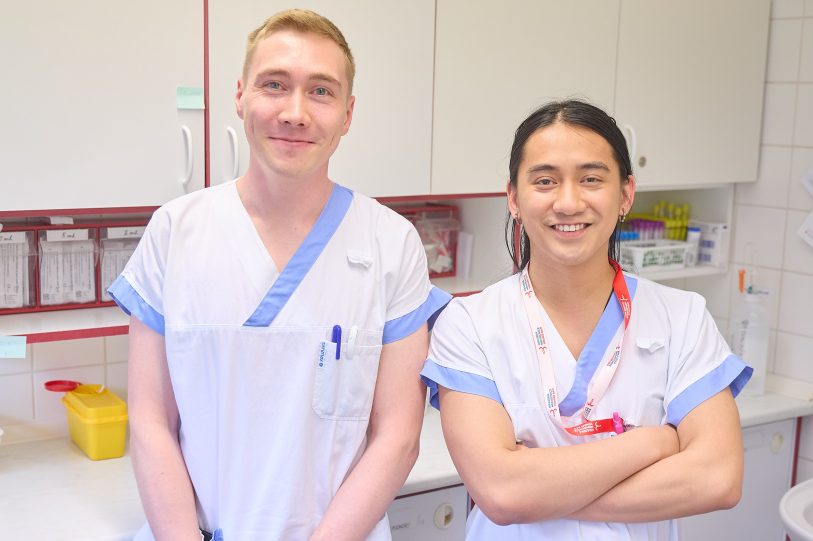
Finnish students shared their impressions of their internship at the Tomas Bata Regional Hospital
16. April 2024Practical internships and study stays abroad are a great bonus that must be used during university studies. The Erasmus+ program also offers these opportunities reciprocally to foreign students who, on the other hand, are looking for another opportunity for their professional and personal development here. As a good example of this practice, we can mention the practical internship of two Finnish students, Joonas and Kaipa, from the Tampere University. Under the Erasmus+ program, general nursing students chose to cooperate with the Faculty of Humanities, which provided them with a practical internship at Tomas Bata Regional Hospital in Zlín.
The Czech Republic was a clear choice for them. They especially appreciated the varied offer in the field of medical education and the approach of FHS, which also allowed them to complete the internship only in English and did not require a deeper knowledge of Czech. During their stay in Zlín, Joonas and Kaipo acquired new practical skills and personally tried some medical procedures that they had not yet been able to do in Finland. They went through a whole series of departments, from the Emergency Department, through Surgery, the Department of Anesthesiology, resuscitation and intensive care, to the Gynecology and Obstetrics Department. The broad scope of the internship allowed them to get a clearer idea of the Czech healthcare system and to compare the healthcare systems of both countries. As he states, Finnish and Czech health care are comparable in many respects, but they also noticed several key differences, such as the higher level of digitization in Finland or free health care in the Czech Republic.
They also faced several challenges while working in the hospital, and although they probably did not expect it, the most difficult obstacle for them was the language barrier. In the end, however, they were able to deal with this problem and greatly appreciated the friendly atmosphere and support provided by the medical staff here.
And what impression did the city Zlín, our university or the internship at the hospital make on Joonas and Kaipa?
“Our first impression of the local hospital was very good. All the employees were very helpful and friendly despite the language barrier. The biggest challenge was, of course, our insufficient knowledge of the Czech language and also the system of 12-hour shifts, which we had to get used to for some time, because we do not work in this regime in Finland.”
You spent two intense months in the hospital. What have you tried during this time? Did you gain any new experience?
“We have definitely managed to improve some skills and medical performances. For example, we thoroughly practiced catheterization and blood sampling. In Finland, we have not yet visited some departments during practice and it was interesting to get the first experience right here in Zlín. We were also interested in the working methods and approaches of the nurses in the various departments. A big benefit was definitely participating in several operations, of which we have to mention at least the robotic abdominal surgery, during which we literally looked over the surgeon’s shoulder.”
Have you noticed any fundamental differences between the Finnish and Czech healthcare system?
“In general, it’s pretty similar. Both have the same services and facilities. If we look at it from an administrative point of view, the Finnish health system is more digitized, but we were told that digitalization is gradually being worked on at Bata´s hospital. However, we were very surprised that health care in the Czech Republic is mostly free, while in Finland it is charged.”
You stated that the biggest obstacle was the language barrier at work. How did you deal with this problem?
“Unfortunately, we speak very little Czech and we only learned a few basic phrases before coming. We would like to communicate more with patients, but because of this deficit we were not able to express our emotions and the necessary empathy to patients. We think that the colleagues have a certain command of English, but they did not often find the courage to approach us. We mostly communicated through our mentor, so we would recommend foreign applicants for an internship to take an introductory course in the Czech language in advance.”
How would you describe the cultural differences between Finland and the Czech Republic?
“There really aren’t any shocking cultural differences. We jokingly say that Finland has a meat and potatoes culture, and it’s pretty much the same here. Of course, due to its geographical location, the Czech Republic is culturally more connected to its neighboring countries, while Finland is a bit isolated in the north.”
What activities or places in Zlín and its surroundings most interested you?
“We like the quiet small town atmosphere. We see a balance between urban areas and nature, and we like that most things are within walking distance. Public transport is very good even if you need to go a bit further from the centre. Zlín is also a surprisingly good starting point if you want to easily travel to other more distant capital cities in Central Europe.”
As stated by the vice-dean of the Faculty of Humanities of TBU and the coordinator of these internships PhDr. M.Sc. Petr Snopek, PhD. MBA, thanks to the cooperation with the Tomas Bata Regional Hospital, interns from abroad are not at the hospital for the first time or the last time. “Last fall, female students from France successfully completed a similar internship, and we have already noticed enormous interest for the upcoming academic semesters.”